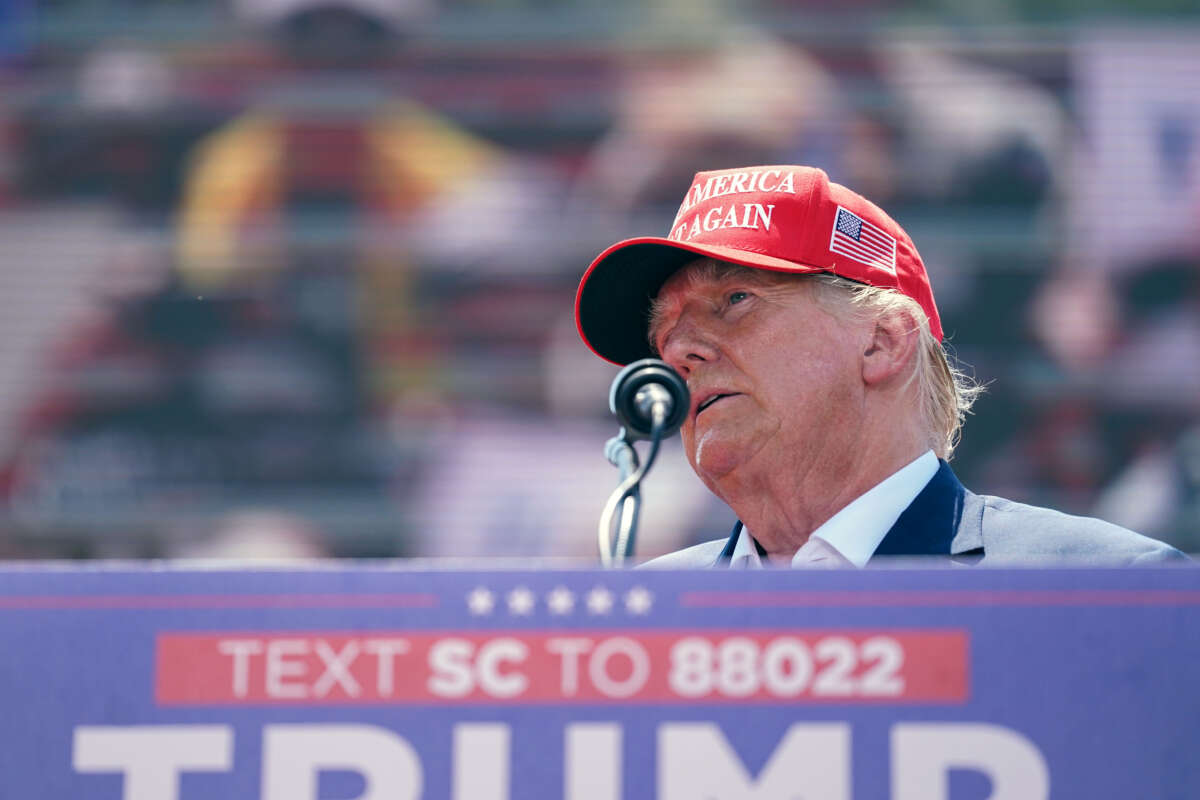Lawyers for former President Donald Trump made a late-night filing on Monday in the federal case involving his improper storage of government documents, many of them classified, at his Mar-a-Lago estate in Florida following his exit from the White House.
The filing from Trump’s lawyers was made in response to a request from the Department of Justice (DOJ) and special counsel Jack Smith to begin the trial — in which Trump faces 37 charges relating to possessing and poorly storing government materials — this December.
Trump’s lawyers, who made the filing just half an hour before the midnight deadline, called for an indefinite delay of the trial beyond the 2024 presidential election.
Trump’s lawyers implied impropriety by the DOJ and suggested that the charges against him were politically motivated, echoing claims frequently pushed by the former president on social media and at rallies.
“The Court now presides over a prosecution advanced by the administration of a sitting President against his chief political rival, himself a leading candidate for the Presidency of the United States,” the filing claimed.
(Neither Trump nor his lawyers have ever presented evidence that the charges against him are politically motivated or otherwise came from an order of President Joe Biden.)
Trump’s lawyers asserted that it would be wrong to start the trial at the end of this year, as the presidential election cycle — including the GOP state primaries — would be starting soon after. “Proceeding to trial during the pendency of a Presidential election cycle…will create extraordinary challenges in the jury selection process,” the filing stipulates, thereby limiting the “ability to secure a fair and impartial adjudication.”
The filing also notes that the case will present a challenge for Trump’s lawyers, who are already focused on a number of other criminal and civil cases the former president is involved in. A new trial will limit the “ability of defense counsel to prepare” for those cases, according to the filing.
Trump has regularly demanded delays when his actions are under scrutiny, including during various points of his presidency. Delaying the trial would be especially beneficial for Trump if he goes on to win the 2024 presidential election.
Trump has hinted that if he becomes president again, he may attempt to pardon himself for the charges against him, an untested and dubious legal strategy that would set up a constitutional crisis. He could also appoint a new attorney general who might drop the charges.
The DOJ will likely submit a response to the filing. Judge Aileen Cannon, who has previously made favorable decisions for Trump regarding the case, will hand down the final decision on whether or not to delay the trial based on both Trump’s and the DOJ’s filings.
Any ruling by Cannon favorable to Trump — particularly one that delays the start of the trial — is likely to face widespread scrutiny, especially in light of newly unredacted information that details how the former president likely sought to obstruct the DOJ’s efforts last year to retrieve the government documents in his possession.
Last week, a different federal judge, Bruce Reinhart, made public previously redacted elements of an affidavit that the DOJ had submitted to him accompanying the agency’s request for a search warrant of Mar-a-Lago late last summer. Those now-unredacted portions include descriptions of surveillance video, in which Trump aide Walt Nauta removed 64 boxes from a storage room that contained the documents but returned only 25-30 of them, prior to a Trump lawyer going through the room and returning what he thought was all of the remaining classified documents to department investigators.
Joyce Vance, a former federal prosecutor and current law professor at the University of Alabama, discussed the unredacted affidavit in a recent Substack post.
Vance highlighted a portion of the document that read “Multiple documents also contained what appears to be [Trump’s] handwritten notes,” likely meaning that Trump personally handled the documents at some point.
“This means Trump won’t be able to claim he never saw the documents — at best he could maintain the notes were written while he was in office,” Vance explained. “But if he resorts to that argument” in his trial, Vance added, “he still has to explain how the documents ended up at Mar-a-Lago after they were in his hands.”
Trump is silencing political dissent. We appeal for your support.
Progressive nonprofits are the latest target caught in Trump’s crosshairs. With the aim of eliminating political opposition, Trump and his sycophants are working to curb government funding, constrain private foundations, and even cut tax-exempt status from organizations he dislikes.
We’re concerned, because Truthout is not immune to such bad-faith attacks.
We can only resist Trump’s attacks by cultivating a strong base of support. The right-wing mediasphere is funded comfortably by billionaire owners and venture capitalist philanthropists. At Truthout, we have you.
We’re in the midst of a fundraiser, and as of right now, we have until midnight to raise $13,000. Please take a meaningful action in the fight against authoritarianism: make a one-time or monthly donation to Truthout. If you have the means, please dig deep.
